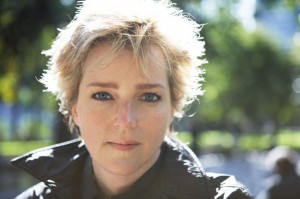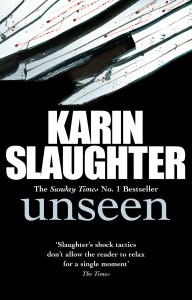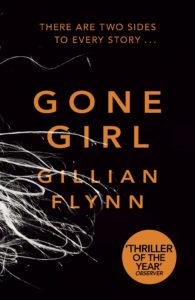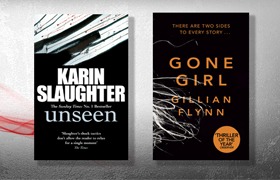Books
Karin Slaughter and Gillian Flynn in conversation
It’s not often that we have a celebrated crime superstar to talk to… so to have two completely unique and much loved crime writers in conversation with each other is unbelievably exciting!
Gillian Flynn’s Gone Girl is a dark and twisted tale of deceit and Karin Slaughter’s Unseen sees the welcome return of Lena Adams, a troubled and feisty heroine. We listened in on Gillian and Karin as they talked robots, Anne of Green Gables and the likeability of their characters.
Karin Slaughter and Gillian Flynn in Conversation


Karin: If you could take any one literary character (not your own) and put it in one of your books, who would it be?
Gillian: I remember reading Thackeray’s Vanity Fair when I was in college and Becky Sharp became an immediate favorite. So manipulative! So clever! So immoral! So charming! One of the all-time great anti-heroes. I think if I dropped her into Gone Girl, she and Amy Dunne would become best friends, and shortly thereafter sworn enemies. They’re both such chilling little winners. They’d admire each other at first – and then they’d tire of the alpha-girl competition and each would start making plans to dispatch the other. Elaborate, complex, frightening plans.
If you could take one of your characters and drop him or her into another author’s book, which character and which book would it be?
Karin: It’d be a tie between Hester Prynne from The Scarlet Letter and the grandmother from Flannery O’Connor’s A Good Man is Hard to Find. If I wrote about Hester, she’d probably be an alcoholic detective who’s searching for the baby she gave up for adoption while simultaneously trying to figure out who committed a series of horrendous crimes.
What’s funny to me is that in Unseen and Gone Girl, we’ve both chosen strong-willed women who paid for it in the end. To a certain degree, your previous books were about the same (neither Camille Preaker nor Libby Day end up singing about “Mr. Bluebird on their shoulders”). I’ve done the same thing, too – Lena has had some fairly horrendous experiences and her reward for that has been… more horrendous experiences! Amy Dunne, on the other hand, totally wins in Gone Girl. Was that on purpose or did it just work out that way?
Gillian: First, I would absolutely read your Hester Prynne spin-off. HP:PI
Second: Oh yeah, it was completely on purpose. Amazing Amy is never not going to win. That’s what she’s built to do. She will find a way. And she’s not a win-win kind of girl. She’s very zero-sum: I must win… and more importantly, you must lose.
I’m so happy that Lena is coming back. You must have a very intense relationship with your series characters. Do you find yourself thinking about them even when you’re not writing? Lena wasn’t in last year’s Criminal, but I wonder if you kind of knew in the back of your mind what she was up to?
Karin: I can’t really recall a time in the past decade when I haven’t been thinking about series characters. In a lot of ways, I envy you because with each book, you get to start over from scratch and put new characters in new settings and you don’t have to remember how old they were in the last book or whether you turn left or right to get into their driveway. It seems like you devote just as much headspace to yours, though, so you probably know what it’s like to live with other people in your brain all of the time. It’s a good thing we’re not in the psych ward.
Gillian: I always set up playlists for my characters, to get me in their mindset. I have tons of ’80s metal from writing Ben Day in Dark Places (and also, fine, because I love ’80s metal). And Nick and Amy each had their own competing playlists (Fiona Apple and KISS and Aimee Mann and Johnny Cash). Basically my iPod freaks people out. You cannot have friends over and let it shuffle because people will be sipping wine and nibbling cheese and all of a sudden Venom is on screaming about satanic sacrifice. It’s a little startling.
Anyhoo… Lena?
Karin: Yes, Lena is back in Unseen. I don’t know about you, but whatever book I’m working on, it’s the next one that I’m really excited about. So, all through Criminal I was thinking about Lena and wondering what she’s up to. The thing about writing series characters is that you have to let them change if they are going to be interesting, especially when you’re talking about a volatile character like Lena. She started out very angry in my earlier novel, Blindsighted, and through the rest of the Grant County novels, you get to see some of those hard edges wear down. In Broken, we see that she’s more self-aware. She is actually starting to wonder if it’s not the rest of the world that’s wrong – maybe it’s her. Unseen is a continuation of this evolution. Lena’s older. She’s married. She’s working in a new job in a new town. She got a reset. Now, whether or not she’s really changed is one of the questions that’s explored throughout the story.
Back to you, Ms. Flynn, I know everybody is already asking you about a sequel to Gone Girl (Super Gone Girl: Missing For Real This Time!) so I’ll ask you about perspective. I know when I’m touring, I generally get asked why I am so hard on men in my books. They’re rapists and murderers and psychopaths and etc. This completely ignores the fact that I write about women who do all those things and more. I wondered if you get this question, too, and what are your thoughts when readers worry about Nick’s little feelings or think that Ben had his reasons?
Gillian: I don’t get too many people who worry about the men in my books. I usually get, “Why are you so hard on women? Do you not like women?” It’s true that I have female characters who are every spectrum of bad – from troubled and angry to sociopathic and murderous. But I have female characters who are decent people too. In Gone Girl, both Go and Boney (that sounds like a really bad cop show) are smart, stable, decent people – they’re the moral cores of the book. But some women are bad. I much prefer giving female characters that range of motion than producing consistently likable female characters. Ugh! What a burden to write only about good and proper women.
Karin: I would totally watch a cop show called Go and Boney. Especially if it had 80s heavy metal in it (Maybe there could be an HP:PI Special Crossover Event?)
It’s such a shame that good and proper women aren’t interesting enough to write a whole book about (take that, Laura Ingalls Wilder!) There’s been a lot of debate in literary circles lately about likeability. Apparently, it’s really out of fashion to write character that readers want to spend time with. While I don’t think every character has to be likeable, I think there has to be something about them that makes you want to stick with them, and that usually comes through some redeeming quality. You trick us in Gone Girl with Amy and Nick because there is a duality to each – a likeable and an unlikeable; each is both a victim and an abuser. That seems to be a consistent theme from your earlier work. Or am I making that up?
Gillian: That “dislikability” trend is pretty new – when we were shopping around Sharp Objects back in 2005, there were a lot of debates about whether readers would stick with a book with such flawed and/or nasty and/or murderous characters. Ah, the times have changed. Do you have a character in your series you personally like the most? The one you’d like to be friends with in real life? I would pick Will Trent, and I know I’m not alone. Has it surprised you to see how beloved he is? I mean, people swoon about that guy. Did you intentionally construct him to be so appealing, or did some weird magic happen in the writing?
Karin: Will is tall, lanky, has a strong, silent streak and does the dishes without being asked. What is not to love?
I think the swooning is from magic, not from me. I felt when I first started writing him that he was a chance to do something new. With Grant County, my characters were defined by their families. So I made Will an orphan. Jeffrey was someone who was very self-confident and used to commanding attention. Will would rather lurk in the corner, watch people, then figure out his approach. Lena wasn’t opposed to slapping people around. That’s not in Will’s make-up. Sara is very scientific in her approach. Will tends to lead more from his gut.
My key into him was realizing that he’s been fussed over by women his entire life – whether at the orphanage or by Amanda or by Angie or by Faith. In many ways he’s very comfortable around strong women. In other ways, he’s as socially adept as a tapir. He’s been with Angie since the age of 11, so he’s never been in a serious “adult” relationship with a woman. He’ll have to learn how to do this before he can really be with Sara.
Anyway, the obvious choice for someone I’d like to hang with would be Will because we watch the same TV shows and we like movies where robots beat each other up. Then again, I’d love to follow Sara around for a day and see how she acts when I’m not around (as in, people aren’t dying). Or Faith would be fun, but she’d probably just want to sit on the couch and read trashy magazines. The only one I’d be a little afraid of is Amanda, because I’ve always secretly thought she can get a little freaky on the weekends. Do I really want to see that? There are some things you can’t walk back.
But, back to you: Sharp Objects is a fantastic book that won all kinds of awards because it was so nasty and murderous. We both entered book publishing early on in the anti-heroes continuum, somewhere between Tony Soprano and Walter White. I think these shows have taught us all that people don’t have to fall in love with a character in order to want to know what happens to them. So, Don Draper and Jackie Peyton have caught up with Heathcliff and Moll Flanders, and suddenly the tail is wagging the dog. You worked as a TV critic for a while, so you know that all trends eventually jump the shark. Do you see that happening in literature any time soon? Are you going to sit down to start a book one day and say, “That Anne of Green Gables gal deserves a reboot!”
Gillian: That’s right: “I picture an entirely new character, one of grace and good will, and I shall name her Pollyanna.” I think any time character “types” start trending, it’s time to get a little nervous. Because then they’re not fuelled by a writer’s instinct and creativity and gut, but by a writer just aiming at the bullseye of what’s selling.
That said – even if dark anti-heroes become passe, it’s hard for me to imagine writing entirely good characters. Or even mostly good characters. When I started writing Dark Places, I wanted the main character, Libby, to be very different for the nasty characters of Sharp Objects. It was my second book, and I was really nervous, and so I wrote a character who made no sense. First-draft Libby (I call that for the name of my next band) was so perky and optimistic and TOTALLY UNBELIEVABLE. She didn’t work at all, so I had to delete her entirely. I normally feel strangely doleful when I delete a character – but she deserved to be deleted. I think that’s the moral (aw, a moral!) here: Write what you believe and what works for your story and what wakes up your imagination. That’s certainly how I pick what to read – what feels unique and genuine and like it couldn’t have come from anyone else’s mind but that particular writer.
Karin: I remember talking to Katherine Stockett about a panel she did with you, and she said, Gillian Flynn just deleted her entire book because she said it wasn’t working! That’s so brave!” and I thought, “That’s not brave! That’s clinically insane!” But, seriously, the work speaks for itself. I think sometimes we have to write crap nobody should ever see before we write the stuff that we can be proud of. Some of my best work comes from a flop sweat of realizing that what I’ve just spent two weeks knowing was going to be perfect and work brilliantly will never make it onto the final page. And I think going down these wrong roads teaches you about your characters, because at the end of the day, the story should always work in service to the characters.
Gillian: I think that’s why your books land with people and not just in the States but overseas readers get really attached to the characters because they’re so real: they have pet peeves and quirky opinions and specific reactions. Even when I finish one of your books and put it down (in the special, beautifully lit Karin Slaughter shelf I had created in my library), part of me can believe that they’re roaming around Georgia still living their own lives.
Karin: I feel the same way about your characters, which is why I always avoid the Midwest. Or as we call it around my house, “Flynn Country.”


More information on Gillian Flynn can be found on her website.
More information on Karin Slaughter can be found on her website.
2 Comments
Join the discussion
Please note: Moderation is enabled and may delay your comment being posted. There is no need to resubmit your comment. By posting a comment you are agreeing to the website Terms of Use.


Just found this – loved it! Must now read Unseen (I’m a huge Lena fan.) Not so keen on Will – hell, I’m still mourning Jeffrey!
Thanks on your marvelous posting! I actually enjoyed
reading it, you are a great author. I wilkl be
sure too bookmark your blog and will often come back aat
some point. I want to encourage yourself to continue your grea
posts, have a nice evening!